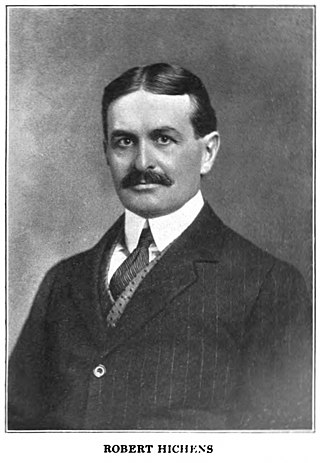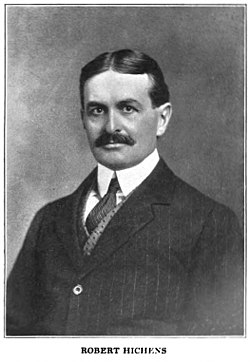Top Qs
Timeline
Chat
Perspective
Robert Hichens (writer)
British writer From Wikipedia, the free encyclopedia
Remove ads
Robert Smythe Hichens (14 November 1864 – 20 July 1950) was an English journalist, novelist, music lyricist, short story writer, music critic and collaborated on successful plays. He is best remembered as a satirist of the "Naughty Nineties".[1][2]
Remove ads
Biography
Summarize
Perspective
Hichens was born in Speldhurst in Kent, the eldest son of the Rev. Frederick Harrison Hichens, and his wife Abigail Elizabeth Smythe.[3][4] He was educated at Clifton College,[5] the Royal College of Music and early on had a desire to be a musician.[1] Later in life he would become music critic on The World, taking the place of George Bernard Shaw.[1] He studied at the London School of Journalism. Hichens was a great traveller. Egypt was one of his favourite destinations – he first went there in the early 1890s for his health.[1] For most of his later life he lived outside England, in Switzerland and the Riviera.[1] Hichens was a homosexual;[6] he never married.[1]
Hichens first novel, The Coastguard's Secret (1886), was written when he was only seventeen. He first became well known among the reading public with The Green Carnation (1894), a satire of Hichens's friends Oscar Wilde and Lord Alfred Douglas; since the work made clear Wilde was homosexual it was withdrawn from publication in 1895,[1] but not before helping set the stage for Wilde's public disgrace and downfall.[1][6]
Hichens was also friends with several other writers, including E. F. Benson and Reggie Turner,[6] as well as the composer Maude Valérie White.[7]

Hichens's first big success was An Imaginative Man (1895); set in the city of Cairo, Egypt, a place which fascinated Hichens, it is a study of insanity, in which the hero becomes dangerously obsessed with the Great Sphinx.[1] Other early fiction includes The Folly of Eustace (1896), a collection of stories including some supernatural;[1] Flames (1897), a story resembling Dr Jekyll and Mr Hyde;[1] The Londoners (1898), a satire about decadent London;[1] The Slave (1899), a fantasy about an amazing emerald;[1] Tongues of Conscience (1900), a collection of five horror stories including "How Love Came to Professor Guildea" (this story is about a supernatural visitation and is thought by some to be Hichens's best fiction – it is frequently anthologised).[1][2] "How Love Came to Professor Guildea" was not initially well-received, with Frederic Taber Cooper calling the story "a hideous bit of morbidity"[8] and Edmund Wilson dismissing the story as "trash".[8] Later reviews of the story were more positive; J. A. Cuddon called it "outstanding" and compared it with "The Horla" by Guy de Maupassant and "The Beckoning Fair One" by Oliver Onions.[9] Brian Stableford described the story as an "authentic masterpiece of horror fiction",[2] and Jason Colavito called it "possibly one of the greatest stories of its age".[8]
Hichens's Felix (1902), is an early fictional treatment of hypodermic morphine addiction, while The Garden of Allah (1904) sold well internationally,[1] and was made into a film three times.
Hichens published his memoirs in 1947, Yesterday.
Remove ads
Selected bibliography
Summarize
Perspective
Novels

- The Coast Guard's Secret (1886)
- The Green Carnation (published anonymously, 1894; republished, 1949) – available at
 Wikisource
Wikisource - An Imaginative Man (1895)
- The Collaborators (1896)
- Flames (1897)
- The Londoners (1898)
- The Slave (1899)
- The Prophet of Berkeley Square (1901)
- Felix (1902)
- The Garden of Allah (1904), elaborately presented as a play in New York City and filmed thrice, in 1916, 1927 (with Alice Terry) and 1936 (one of the earliest three-strip Technicolor features, with Marlene Dietrich and Charles Boyer)
- The Woman with the Fan (1904)
- The Call of the Blood (1906)
- Barbary Sheep (1907)
- A Spirit in Prison (1908)
- Bella Donna (1909), in which Alla Nazimova starred on Broadway in 1912, filmed in 1915, in 1923 with Pola Negri and in 1934 with Mary Ellis and Conrad Veidt.
- The Fruitful Vine (1911)
- The Dweller on the Threshold (1911)
- The Way of Ambition (1913)
- In the Wilderness (1917)
- Snake-Bite (1919)
- Mrs. Marden (1919)
- Spirit of the Time (1921)
- December Love (1922)
- The Last Time (1924)
- After the Verdict (1924)
- The Bracelet (1930)
- The First Lady Brendon (1931)
- Mortimer Brice (1932)
- The Paradine Case (1933) – film version directed by Alfred Hitchcock in 1947
- The Power To Kill (1934)
- The Pyramid (1936)
- The Sixth of October (1936)
- Daniel Airlie (1937)
- Secret Information (1938)
- The Journey Up (1938)
- That Which Is Hidden (1939)
- The Million (1940)
- A New Way of Life (1942)
- Veils (1943)
- Harps in the Wind (1945)
- Beneath the Magic (1950)
Collections
- The Folly of Eustace: And Other Stories (1896)
- Bye-Ways (1897)
- Tongues of Conscience (1898, 1900)
- The Black Spaniel: And Other Stories (1905)
- Snake-Bite: And Other Stories (1919)
- The Afterglow and Other Stories (1935)
- The Return of the Soul and Other Stories (2001; ed. S. T. Joshi)
Nonfiction
- The Spell of Egypt (1910)
- Yesterday (1947)
Anthologies containing stories by Hichens
- Great Short Stories of Detection, Mystery and Horror 1st Series (1928)
- Alfred Hitchcock Presents (1957)
- The 2nd Fontana Book of Great Ghost Stories (1966)
- Medley Macabre (1966)
- Black Water (1984)
- I Shudder at Your Touch (1992)
- 4 Classic Ghostly Tales (1993)
Short stories
- "How Love Came to Professor Guildea" (1900)
- "Demetriadi's Dream"
Plays
- The Law of the Sands (1916)
- Black Magic (1917)
- The Voice from the Minaret (1919)
Remove ads
Filmography
- Bella Donna, directed by Edwin S. Porter and Hugh Ford (1915, based on the novel Bella Donna)
- The Garden of Allah, directed by Colin Campbell (1916, based on the novel The Garden of Allah)
- Barbary Sheep, directed by Maurice Tourneur (1917, based on the novel Barbary Sheep)
- Flames, directed by Maurice Elvey (UK, 1917, based on the novel Flames)
- The Slave, directed by Arrigo Bocchi (UK, 1918, based on the novel The Slave)
- Hidden Lives, directed by Maurits Binger and B. E. Doxat-Pratt (Netherlands, 1920, based on a play by Robert Hichens and John Knittel)
- The Call of the Blood, directed by Louis Mercanton (France, 1920, based on the novel The Call of the Blood)
- The Woman with the Fan, directed by René Plaissetty (UK, 1921, based on the novel The Woman with the Fan)
- The Fruitful Vine, directed by Maurice Elvey (UK, 1921, based on the novel The Fruitful Vine)
- The Voice from the Minaret, directed by Frank Lloyd (1923, based on the play The Voice from the Minaret)
- Bella Donna, directed by George Fitzmaurice (1923, based on the novel Bella Donna)
- The Lady Who Lied, directed by Edwin Carewe (1925, based on the story The Lady Who Lied)
- The Garden of Allah, directed by Rex Ingram (1927, based on the novel The Garden of Allah)
- After the Verdict, directed by Henrik Galeen (UK, 1929, based on the novel After the Verdict)
- Bella Donna, directed by Robert Milton (UK, 1934, based on the novel Bella Donna)
- The Garden of Allah, directed by Richard Boleslawski (1936, based on the novel The Garden of Allah)
- Temptation, directed by Irving Pichel (1946, based on the novel Bella Donna)
- The Paradine Case, directed by Alfred Hitchcock (1947, based on the novel The Paradine Case)
- Call of the Blood, directed by John Clements and Ladislao Vajda (UK, 1948, based on the novel Call of the Blood)
References
External links
Wikiwand - on
Seamless Wikipedia browsing. On steroids.
Remove ads

